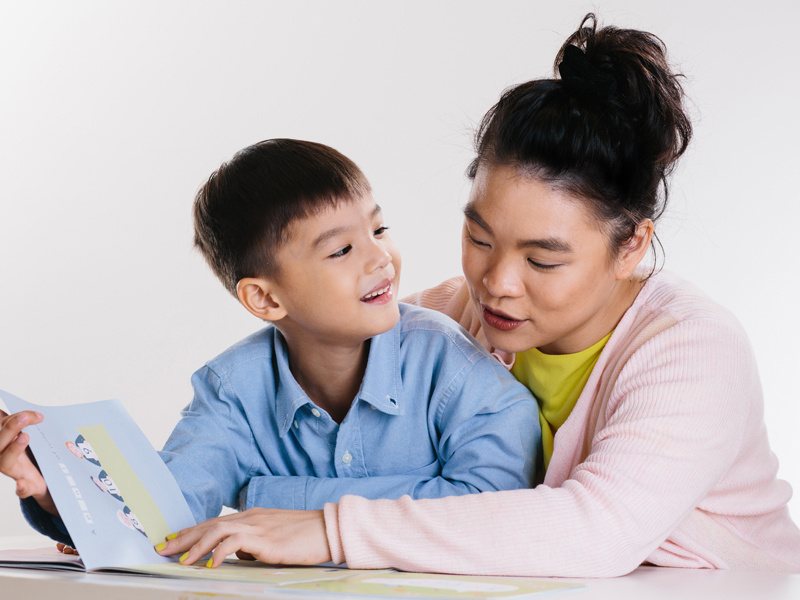
New year, new school, new opportunities for growth! Read our article as we share some tried and true tips for parents and children in the lead up to the first day of primary school.
A Whole New World Awaits
New classmates, new teachers, new school environment — your child’s tiny world is about to get a lot bigger. With these changes come opportunities for personal, social and cognitive growth.
The Countdown And Preparation Begins
In these weeks as you count down to your child’s first day of school, you may be wondering, “What will school be like for my child? Will my child be able to cope in the new environment?”
Parents can help by being proactive — research from professionals at Duke University suggests that establishing a strong communication channel with your child’s teachers helps and so does monitoring changes in your child's behaviour or mood when he or she first starts school.
Whether at home or in school, we’ve got some great tips for every stage of preparation that will help you (and your child) pave a smooth journey towards the new school term in January.
1. Create A Routine That Works
Studies have shown that routines help children feel safe and secure. Set up a routine that works for your child — whether it’s a shower before dinner or an afternoon snack before naptime, it’s important that your child gets into a routine that he or she is comfortable with.
2. Identify Friendly Figures In School
Helping your child identify teachers or staff he or she can go to for assistance is important. When your child recognises trustworthy figures of authority, he or she will feel more secure in the new environment.
Related Article: Gear Up For Primary 1
3. Prepare An 'Emergency' Fund
You may want to consider setting aside an “emergency fund” for your child. Placing extra money in a separate wallet or purse to be kept in his or her school bag means that your child will still have access to money if he or she misplaces pocket money. However, you should set some strict rules about when this money can be used.
4. Test Out That Transport Route
It may be a good idea to have a few dry runs of your child’s journey to and from school to help your child familiarise himself or herself with the route. Help your child identify key landmarks and remember the specific place where he or she will be dropped off or picked up from everyday.
Related Article: Raising A Responsible Child
5. Set Mini Goals To Achieve Together
Help to make the experience seem less daunting by setting mini goals for the first day of school. Start with small tasks like “Leave the house on time” or “Remember to bring my water bottle home” or “Meet one new friend in class today”. These mini goals give your child something to look forward to on his or her first day of school!
Download Our Special Guide To Surviving And Thriving In Primary 1
The Learning Lab would like to extend our help as you and your child are preparing for Primary 1 and the new adventures that lie ahead. Download our fun and informative guide filled with 25 great tips to help your child survive and thrive in Primary 1!
We take inspiration from the words of surrealist painter Salvador Dali when he said, “Have no fear of perfection — you'll never reach it”.

While it may seem like a pessimistic statement, it's a philosophy that Dali passionately believed in. This seemingly bleak thought led him on the path of success to becoming one of the most celebrated artists of his era and beyond.
This is because aiming for perfection takes away the joy of learning and joy is a much more powerful motivator than pressure or fear of failure.
Here at The Learning Lab, we encourage students to aim to be the better version of their true selves, so they may grow up to be joyful and intelligent adults with healthy dispositions. Help us to reinforce these values by trying these tips at home.

1. Point out Areas of Improvement as Soon as Possible
Giving immediate feedback is an opportunity to identify areas of improvement while the information is still fresh in your child’s memory. Correcting your child’s mistake before he or she receives other mental input is more effective than going through the process at a later stage.
But don’t just give generic feedback that can leave your child wondering where exactly he or she made a mistake. Effective feedback is specific, positive and offers a solution or a perspective.
For example, rather than saying, “This is confusing,” which sounds dismissive or like you're scolding him or her for it, you can instead ask: “When you did this, did you mean for X or Y or Z to happen?” which shows genuine interest in what your child is doing.
If you are well-versed in the subject or topic, you may also point out your child’s mistake and explain what went wrong and how he or she can better go about solving the problem if it arises next time. This will allow your child to learn from the mistake which is still fresh in his or her mind before it goes on to become a habit that is harder for your child to break out of.

2. Remove Judgment and Be Compassionate About the Experience of Failure
Whatever the circumstances of your child’s performance or behaviour in school and personal life, harsh judgment or punishment will not make it better.
It has been observed that self-compassion helps in coping with academic failure because it allows students to see the situation clearly without the loss of perspective that stems from excessive self-criticism, feelings of isolation, and over-identification with their experience.
Besides the academic side of things, this concept is also applicable to your child’s life outside of school too. Instead of confronting your child and making him or her feel ashamed or embarrassed about a defeat or a mistake, try asking, “How do you feel about this?”
Chances are that your child doesn’t enjoy his or her failures any more than you do. It’s important for children to feel safe and know that their parents will always be a source of support for them. This will enable children to develop an inclination to learn and grow from their mistakes.

3. Teach the Skill of Evaluation and the Value of Accountability
It’s one thing to be a harsh critic and another to be an honest observer.
Being an honest observer is being able to detect the source of the mistake by going through the events that led to it without overthinking the details.
It’s about learning from the process without putting negative attachment to the result. It is about asking, “Could I have achieved a different result?” followed by: “How?”
On the other hand, being a harsh critic is merely picking at the result without understanding the process.
For example, if your child got reprimanded at school for calling another classmate names, you could teach your child to be honest observer and see things from the other child’s perspective. By doing so, your child would be better able to see how his or her words could have hurt his or her classmate.
That way, your child would learn to take responsibility and accountability for his or her actions going forward.

4. Express Appreciation When Your Child Admits to a Mistake
We like the words shared by American author and family therapist Virginia Satir:
“Feelings of worth can flourish only in an atmosphere where individual differences are appreciated, mistakes are tolerated, communication is open, and rules are flexible — the kind of atmosphere that is found in a nurturing family.”
Children are more likely to seek guidance from adults when they feel safe in admitting their mistakes. This trust and feeling of security could be exactly the assurance they crave in order to avoid setbacks and do better next time.
For example, if your child bullied a classmate but owns up to it and tells you, instead of launching into a tirade, you can explain why it is wrong to do so and share different ways he or she could resolve this. At the same time, tell your child how much you appreciate him or her coming to you about this. By doing so, you’re creating an environment of trust so your child will be more inclined to share any future issues with you.

5. Curb Avoidance and Blame Shifting
“He started it first,” and “it’s not my fault,” are common phrases that children may use to deflect the blame.
It is natural for your child to avoid the conversation over an issue and blame others for a mistake. After all, it is only human nature that no one likes facing negative consequences for their actions. Blame shifting happens when children blame others or external circumstances for their behaviour and mistakes.
If your child did something wrong and is reluctant to own up to mistakes, he or she may shift the burden of blame to others. There shouldn’t be cause for alarm when this happens, but it is something that you can work on curbing together with your child.

If this situation ever arises, you can assure your child that it’s all right to admit to blunders and that taking responsibility for these errors is a courageous and decent quality to nurture in himself or herself. You can go on to brainstorm ways to avoid the situation in the future.
In circumstances involving more than one naughty party, ask your child: “What do you think your contribution was to this situation?” and “How would you avoid this from happening next time?”
Not only does this teach your child how to be mindful and aware of his or her behaviour in the future, it also imparts problem-solving skills. These problem-solving skills can go a long way in your child’s growth, as the more ideas your child has in solving certain issues, the less likely he or she will commit the same lapses in judgement in future.
At The Learning Lab (TLL), we are receptive to our students making mistakes. From each mistake made, regardless of whether it’s an academic or personal blunder, our teachers get to understand the students a little bit better. From there, our teachers would know what to do to go about solving these alongside our students.
The overarching message is for all of us adults, parents and teachers alike, to remind young learners that mistakes and failures are necessary tools to grow and thrive. Mistakes reveal new insights and “eureka” moments. Learning, after all, is an infinite journey with natural highs and lows.
If you have other tips or stories about your child to share with us and fellow parents, we’d love to hear from you. You can learn about our alumni’s learning journey with TLL, the life lessons they have taken away from TLL, and how they have blossomed into the fine working professionals they are today by clicking on the button below.

Embrace Mistakes as Opportunities to Learn
At The Learning Lab, we are receptive to our students making mistakes. From each mistake made, regardless of whether it’s an academic or personal blunder, our teachers get to understand the students a little bit better. From there, our teachers would know what to do to go about solving these alongside our students.
The overarching message is for all of us adults, parents and teachers alike, to remind young learners that mistakes and failures are necessary tools to grow and thrive. Mistakes reveal new insights and “eureka” moments. Learning, after all, is an infinite journey with natural highs and lows.
The Learning Lab is now at locations. Find a location that suits your needs.
If you have any questions about our range of programmes or class schedules, you may contact us at 6733 8711 or drop us an email at enquiry@thelearninglab.com.sg.


